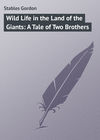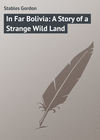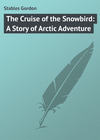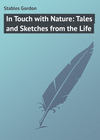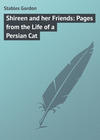Читать книгу: «Wild Life in the Land of the Giants: A Tale of Two Brothers», страница 15
Chapter Twenty Eight
The Dreaded River-Lion – Adventure on the Plains – Lost in a Snowstorm – “To Sleep were Death.”
The grief of Jeeka and his wife Nadi for the death of their infant was positively painful to witness. Every one in the camp seemed also to partake in it. There was a kind of wake held the night before the funeral, and the wailing was greater than anything I have heard in Ireland on a like occasion.
At the grave, the horse on which Nadi and baby had travelled all across the Pampa was thrown and strangled, and all the child’s trinkets and playthings and even clothes were burned. The body was rolled in a guanaco robe and laid to rest, the clods were heaped in, and snow put over these. Then we all came silently back.
Next day everything was in statu quo except that baby was not there. We could trace signs of deep grief and a sleepless night in Jeeka’s and Nadi’s faces but they made no reference of any kind to their dead and gone darling.
One calm cold day, Ritchie and Jill returned from the river to say that they had seen a most wondrous sight. A huge animal with terrible teeth and eyes, shaped somewhat like a tiger, had rushed up out of one of the deepest, darkest pots or pools and attacked a native dog which was standing near.
The fight had been sharp and fierce, but before assistance could be rendered, the beast, whatever it was, had conquered the dog and dragged him down under water.
“Gol de Rio. Gol de Rio,” said Jeeka, who had heard the account. “Not go near. He all same as one Gualichu. Bad man! So, so.”
“Bad man here, or bad man there,” said Ritchie, “I mean to have a shot at him.”
We backed Ritchie in his wish, but as there was evidently no chance of getting Jeeka to come with us, we determined to set out ourselves next day.
We did, and waited four hours in ambush. But all in vain. The Gol de Rio, or water-lion, never showed face.
“He is gorging on the poor dog,” said Ritchie. “Let us give him a rest for a day or two.”
“I’ve a plan,” said Jill. “Let us tether the guanaco lamb to the bank, and stand by with our guns.”
The lamb was a poor forsaken little beast we had found half-dead beneath a tree, and taken home and tried to rear.
The plan was feasible. We went very early next morning and tied the wee thing up to a bush near the bank. It seemed to know there was danger as if by instinct, for it struggled and cried most plaintively and pitifully.
Meanwhile we hid behind a rock, with our guns in position.
We had not long to wait. First there was a ripple on the pool, then a monster brownish-yellow head was protruded, with paws near it paddling lightly as if for support. The face was whiskered, and the eyes looked extremely fierce. The beast looked cautiously round first, then it eyed the shivering lamb, and at once made for the bank.
When near its intended victim, it stopped as if about to spring, moving its long moustache rapidly fore and aft, as a cat does.
Three rifles rang out sharp and clear in the wintry air. Next moment the huge beast had turned on its back, and its death struggle was a brief one.
This was Jeeka’s Gol de Rio. He certainly merited the title; a more repulsive specimen of river otter I have never seen, before nor since.
We dragged him home with a lasso, and the Indian women and children ran screaming to their toldos when they saw him.
I was told afterwards that this river-lion had more than once seized children who were playing on the banks of the stream, and I can easily believe it.
Do horses, I have often wondered, possess any instinct to warn them of coming danger? The following adventure would seem to prove that they do.
One bright clear morning, Jill and I made up our minds to ride over to the lake in the plains and bring home, if possible, some birds. We took with us Ossian and Bruce. There was not a cloud in the sky when we set out, and all the surface of the ground was covered with hard dry snow. Unlike Patagonian Indians, white men cannot go very long without food; so Jill and I took a good solid luncheon in our bags, quite enough for ourselves and the dogs also. We had a snack behind our saddles also, so that I might say no huntsmen ever started in quest of sport under happier auspices.
“Good-bye, Peter, if you won’t come,” “Good-bye, Peter, if you won’t come,” we cried.
“My bumps!” shouted Peter.
So we waved him a laughing “Adieu!” and went cantering off.
“As the frost is so hard and the day so fine,” I said to Jill, “I think we’re sure to find some feathers on the lake, for it seldom if ever freezes.”
“We’re sure to, Jack. And won’t we look fine, clattering into camp to-night with the ducks and the geese all dangling to our saddles.”
“Peter will be jealous.”
“Poor Peter! it’s a pity he can’t ride better.”
So on we trotted, talking and laughing right merrily. Presently Jill said —
“Sing, Jack; I can give you a bit of a bass.”
I did sing, a rattling old saddle-song that I had learned at the Cape. Jill joined in, the horses’ feet kept excellent time, and the very dogs barked with glee as they went galloping on in front.
“Could anything be more jolly?” said Jill.
“Nothing in the world, Jill. I feel as happy as a village maid on her marriage morning.”
“Yes, and happiness and hunger go together. I think I could pick a bit already.”
“Jill, Jill! you’re just the same now as when a boy. Put anything in your pocket, and there never was any keeping your hands from it.”
At long last the black water of the lake appeared, and our happiness came to a crisis when we noticed numerous flocks of birds on it, grey, black, and white.
We would have a good bag.
We trotted round the water’s edge and finally dismounted.
All the forenoon we walked about, and had many a good shot. Bruce duly retrieved everything, and Ossian sat on the bank and looked on.
Then we went back to our horses, fed them and had our own luncheon; resting a good hour afterwards on the snow. The sun was shining so brightly that we did not feel the cold.
It was by this time pretty far on in the afternoon, but we had not yet made up the splendid bag we had promised ourselves; so we determined to continue the sport, although we already felt somewhat tired, the ground being rather rough.
This time we took the precaution to tie our horses to the calipaté or barberry bushes, with lassoes.
The day drew so quickly to a close – apparently, I mean, for time does slip fast away when one is enjoying himself.
When the sun sank at last, we found ourselves two good miles at least from our homes. We could not do the distance on such ground, and carrying so much game, under an hour.
“Never mind, Jill,” I said; “there will be a moon, you know.”
“Half a moon, but that’ll be enough. I believe I shall quite enjoy the canter home under the stars.”
“What is that yonder, Jill?” As I spoke, I pointed to a long white ridge that was slowly rising over the wooded hills and sierras.
“That is cloud!”
“I hope we are not going to have a change of weather.”
“Never mind, we’ll soon get home. An hour and a half will do it. Hurry up.”
We had been looking for a few minutes more at the ground beneath our feet than at anything else. When I glanced along the lake edge again, I could not believe my eyes, for a moment or two.
Jill gazed in the same direction.
“Our horses were gone!”
Far away on the plain we could descry two black moving spots. These were our steeds, but miles beyond our power of recall.
Night had quite fallen before we left the lake side, for we had to go right back to the places from which our horses had stampeded for our guanaco mantles.
The stars were shining brightly, and high in the heavens was Jill’s half-moon; so that for a time we had light enough. We gave many an anxious glance towards the west, however. We naturally wondered whether our horses had gone straight home. If so, assistance would speedily come. It was unlikely, however, for, excited with having obtained their freedom, the animals would be more apt to make for the forest, there to play truant for a time and crop the twiglets – already breaking into bud and burgeon – from their favourite bushes and trees.
By the time we had walked about three miles we felt very tired indeed, and agreed to abandon our game. We put them, therefore, in a heap on the plain, and continued our journey. But for that ominous cloud bank which was rising higher and higher, we should have taken the journey more easy, and perhaps have rested a while.
On we walked, almost dragging our weary limbs now. The night still continued fine, the moon seemed to change into molten silver, the stars literally sparkled and shone like diamonds in their background of dark ethereal blue.
There was something almost appalling, however, in the gradual approach of that great sheet of cloud, rising grim and dark on the western horizon. It came on and up more swiftly every minute, and soon covered one whole third of the heavens.
On and up, on and upwards, swallowing star after star, constellation after constellation, and now it has reached the moon itself, and for a moment only its outer edge is a rim of golden light; then the moon too disappears, is buried in the black advancing mass. Almost at the same time the wind comes moaning over the plain, accompanied with driving snow. It increases every minute, and soon it is nearly impossible to walk against it.
It is almost a hurricane now; it moans no longer, it roars, shrieks, howls around us, and the snow freezes into cakes upon our garments, into ice on our faces, into icicles on our hair.
Sometimes we turn round and walk with our backs to the terrible blast. Often we fall, but we help each other up, for we are hand in hand as brothers ever should be.
Jill whispers – it seems but a whisper though he is shouting – in my ear at last.
“I can do no more, brother. I am sinking.”
I feel glad – glad of the excuse to sink down among the snow and rest a little. Only a little. We creep close together, with our backs to the storm, pulling up our mantles round our heads and drawing in our legs for warmth. Oh, those good guanaco mantles, what a blessing they are now!
I keep talking to Jill and he to me, though we each have to shout into the other’s ear.
I remember calling —
“Jill, we must not sleep. Are you drowsy?”
“No, not very.”
“To sleep were death.”
After a few moments, in an agony of desperation, thinking and fearing more for my brother than myself, I spring up, and again we try to wrestle on. The dogs keep close to our heels, though we hardly can see them, so covered are they with snow and ice.
In vain, in vain. We can go no farther, and once more take shelter beneath our robes of skin. Ossian and Bruce creep partly between us.
We talk no more now, but determinedly try to keep awake.
A whole hour must have passed in this way. I am not on the plain now, it seems to me. I am wandering with my brother over the moorland at home, where when boys we met the convict. But the moor is strangely changed; it is all a-glimmer with radiant light. Every bush, branch, twig, and twiglet seem formed of coloured light or flame; the scene is gorgeous, enchanting.
Suddenly, all is dark. My brother is wrenched away from my grasp, and – I awake shrieking. I awake to find myself lying on the log-house floor on a couch of guanaco skins.
My brother is safe, and even the dogs.
In an hour’s time we are both well enough to get up and refresh ourselves with a cup of Pedro’s yerba maté.
But our escape had been little short of miraculous. We had wandered a long distance out of the track, for the wind had gone round, and were entirely buried when found, only faithful Ossian and Bruce’s voices had been heard high above the roaring storm.
We owed our lives to them.
Chapter Twenty Nine
The Fight ’twixt Winter and Spring – A Never-to-be-Forgotten Evening – Attacked by Northern indians – The Fire
Would Springtime never come again?
We had expected it weeks ago. The birds and beasts in the forest had expected it too. The former had commenced to sing, the latter had grown unusually active; guanacos had been in search of tender herbage, pumas had been in search of the guanacos. Hungry, lank, dismal-eyed foxes had come down to stare at the toldos when the dogs were eating; and even the armadillos had unrolled themselves from cosy caves and corners, and crawled at night towards the encampment.
Then the new snowstorm had come on all so suddenly too.
The denizens of the woods had taken shelter under the trees; in some of these the branches, snow-laden, had dropped groundward, forming quite a series of tents in the forest. In these the Indians had found whole colonies of great gawky-looking ostriches, and had made a harvest in feathers.
Lawlor, wading through the snow one day, and peeping in under the trees, came face to face with a puma. It would have gone hard with him had not Ritchie, rifle in hand, been close alongside and shot the huge beast while it was in the very act of springing.
But the dreary season came to an end at last, and the snow began to melt and to fly away. Then winter and spring seemed to fight together for the mastery. Winter riding on the wings of a fierce west wind that roared harshly through the woods and bent the trees before it. Winter driving before him battalions of threatening clouds, white, grey, and black, and trying to blot out the sun. Frost, with his crystal cohorts, struggling for every inch of ground, fighting for the lake of the plains, which had succumbed to the last terrible storm and was hardened over; fighting for the streams, the rapids, the cataracts.
The sun, in all his beauty and splendour, shooting out every now and then into the rifts of blue, and sending his darts groundwards at every unprotected spot, each ray a ray of hope for the long-enslaved earth. Sunshine glittering on the leaves of evergreen shrubs, shining on the needles of pines, and adorning every budding twig with radiant dew-drops, that erst were crystals of ice.
Spring victorious on the higher grounds, and sending down torrents and floods to assist its triumph in the lowlands and plains.
Winter at last vanquished and gone, and forced to fly even from under the trees and every shady nook.
Now comes a warm soft breeze from the north and the east, and all the land responds to it. Torrents still pour from the hills, but the woods grow green in little over a week, and wild flowers carpet every knoll and bank.
We are all active now in the estancia and in the camp. We are preparing for the long march back over the Pampa to Santa Cruz, where Castizo says he doubts not his little yacht is already lying safely at anchor, and his daughter anxiously waiting his appearance.
Horses are now better fed and tended, and regularly exercised day after day. Saddles are repaired, and stirrups and bridles seen to. The women are busier than ever with their needles. Boys and girls are twining sinews for the strings of bolas and for lassoes. The dogs seem wild with delight. They all appear to know we will soon be on the march once more, and they dearly love their life on the plains.
Our stores are nearly exhausted – I mean our coffee, tea, maté and sugar. Flesh is still abundant, and always is. So no one will be sorry to leave this lovely forest nook, albeit we have spent many a happy day in it.
“In three days more,” said Castizo one evening, as we all sat round the blazing logs, “we will be ready to start.”
“I feel a little sorry in leaving this place,” said Jill.
“There is nothing but leave-takings in this world,” said Castizo; “and the happier one is the quicker the time flies, and the sooner seems to come this leave-taking.”
“Never mind,” said Peter; “if our good cacique would only say he would take me, I should be right glad to return with him another day.”
“You will come back, I dare say, sir?” said Ritchie.
“If spared, yes. I may not spend another winter here though, for the simple reason that I will not have such pleasant company. I am fond of loneliness, still I shall ever look back to this winter as to some of the happiest months ever I spent in all my chequered career.”
“So shall we all,” I made bold to say.
“Hear, hear,” said Peter and Jill.
“You’ve been happy, Pedro?”
“Ah! señor, multo, multo.”
“Peter, your pipe.”
“Is that a command,” said Peter.
“Certainly. Am I not still your cacique?”
Peter got his pipe and commenced to play, and presently, after a gentle knock at the door, in came the giant Jeeka and his wife Nadi. They stood at some little distance till invited to draw nearer the fire. Then they squatted on a guanaco skin, Jeeka holding his wife’s hand in his lap, and both looking so pleased and happy.
I shall never forget their faces. I have but to place my hand over my eyes at this moment, and I see them once again.
Alas! little did they know what was before them. And little did any one there expect what happened before the sun of another day crimsoned the peaks of the lofty mountains.
Peter, Jill, and I sat long that night in our little room before turning in, talking of home. But Peter had something else to speak about. Need it be said that Dulzura – as he still delighted to call her – formed his chief subject for discourse to-night.
“Oh,” he said, “I only wonder you fellows did not hear my heart going pit-a-pat, when Castizo told us his daughter was coming round in the yacht.”
“My dear Peter,” Jill said, “I do believe you are actually in love.”
“Is it the first time you’ve discovered it, my honest Greenie? Haven’t I cause to be? Was there ever such a lovely or fascinating creature in the world as Dulzura! And I’m a man now, remember. Twenty-one, boys, or I will be in a month.”
He stroked an incipient moustache as he spoke, and appeared savage because Jill and I laughed at him.
“Suppose Dulzura is already engaged?” said Jill, somewhat provokingly.
“Jill, you’re a Job’s comforter,” replied Peter. “Of course, if she is engaged, there’s an end to the matter. I’d enter a convent and turn a father.”
“A pretty father you’d make,” cried Jill, laughing again.
“All right,” said Peter, “Wait till you’re in love, Greenie, and won’t I serve you out just!”
“Well, boys,” I put in, “a happy thought has just occurred to me.”
“Let’s have it.”
“Suppose we cease talking and all go to bed.”
“Right,” cried Peter, jumping up and beginning to undress.
In a few minutes more “good-nights” were said, and we were composing ourselves to sleep. Sleep in this region is deep and heavy, and I may surely add healthy, for one awakens in the morning feeling as fresh as the daisies or the proverbial lark.
I did not seem to have been asleep a quarter of an hour when Peter shook me by the shoulder.
“Jack, Jack,” he was saying, “there is something up.”
Peter was already dressed, and accustomed as I had been to scenes of danger I was soon following his example, though hardly knowing where I was or what I was doing.
“Don’t you hear?” said Peter.
I listened now. In a moment I was as wide awake as ever I have been in my life.
I remember everything that happened that morning as though ’twere but yesterday. It was morning too. Our windows faced the east, and there was a faint glimmering of the dawn already in the sky.
From the direction of the Indian camp, came first a subdued hum of angry voices. These were soon mingled with shouts of men and screams of women and children, and presently there were added the clash of weapons and the ring of revolver shots.
“They are fighting down at the toldos,” said Peter. “Hurry up with your dressing.”
“Whom are they fighting with?”
“I cannot say. It may be mutiny. Either that, or the Northern Indians are on us.”
“Heaven forbid.”
“Here, Greenie!” cried Peter.
“Jill, Jill!” I shouted, “Get up, brother. They are fighting.”
Jill sat up and listened for a moment, then threw himself doggedly back again on his pillow.
“Jill!” I roared, shaking him viciously, “get up, you silly sleepy boy. The Indians are on us.”
Jill appeared fairly roused now. He sprang up and began to hurry on his dress.
We, that is Peter and I, got our revolvers and stuck them in our belts – they were always kept loaded; then we took our swords and sallied out.
“Follow quick, Jill,” were my last words to my brother. “Look out for me and get to my side. We may have to do a bit more back to back work.”
We saw at a glance that it was Northern Indians with whom we had to deal, and quite a large party.
The fight was raging fiercely. Peter and I overtook Ritchie and Lawlor hurrying into the fray, and joined them. Castizo was already there. We could hear his stern words of command, and we noticed too that his revolver emptied many a saddle. Our people were fighting on foot, but fighting well and bravely. The women and children had already fled to the forest.
We came up at the right time, evidently, and the volleys we poured in created the greatest confusion in the ranks of the enemy. They seemed staggered for a little while, and made as if to retreat, but were rallied and came on once more to the charge.
How long we fought I could not say; it might have been ten minutes, or it might have been half an hour.
Suddenly there was a momentary lull, and I looked about me for Jill. He was nowhere to be seen. I shouted to Peter. He had not seen him. I extricated myself from the mêlée as best I could, and hurried back to the log-house. The poor foolish fellow must have gone to sleep again. As it happened, this is precisely what he had done. But, to my horror, I found the log-house surrounded by smoke. It was on fire.
And my brother was there, in its midst.
How I reached the door I never knew. At first I seemed dazed, nor am I certain that at any period of that dreadful night I regained the equilibrium of my senses.
I rushed in through smoke and flames. I could just distinguish my brother’s form lying half-dressed on his couch, but was speedily obliged to retreat.
Then I remember feeling angry with the fire, mad almost. Why should the flames take my brother from me, the being I loved as my own soul? No, no! Save him I must, save him I should! I looked upon the fire as a living thing, as a cruel, remorseless, merciless wild beast. I fought the fire. I defied it. I was calm, though; that is, I was calm as regards the rational sequence of my actions, but in reality I was a maniac for the time being. Do men, I wonder, who do marvellous deeds of daring in the field or lead forlorn hopes, feel and fight as I then did?
With a strength that did not appear to be my own, I tore down the blazing door-posts and door that barred my entrance. Then once more I was in the room. Groping around now, stumbling too, for I could see nothing in the smoke. Ah! here at last I have him; I have him at last now!
Out now I struggle and stagger, and fall choking in the morning air.
Покупайте книги и получайте бонусы в Литрес, Читай-городе и Буквоеде.
Участвовать в бонусной программе
